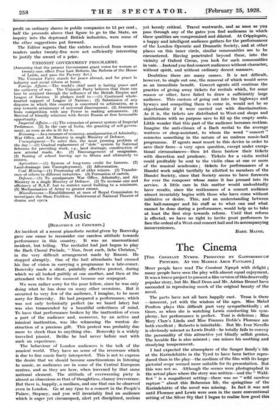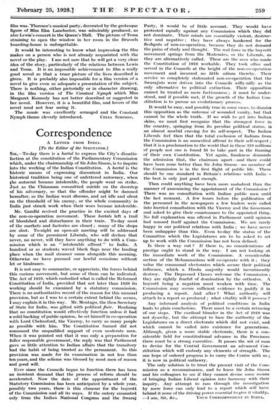The Cinema
[THE CONSTANT NYMPH. PRODUCED BY GAINSBOROUGH PICTURE-S. AT THE MARBLE ARCH PAVILION.]
MOST people have read The Constant Nymph with delight ; many people have seen the play with almost equal enjoyment. It was a brave project to present a film version of this deservedly popular story, but Mr. Basil Dean and Mr. Adrian Brunel have succeeded in reproducing much of the original beauty of the novel.
The parts have not all been happily cast. Tessa is there —innocent, yet with the wisdom of the ages. Miss Mabel Poulton plays this difficult part very sympathetically ; at times, as when she is watching Lewis conducting his sym- phony, her performance is perfect. Toni is delicious ; Miss Mary Clare's Linda and Miss Frances Doble's Florence are both excellent ; Roberto is inimitable. But Mr. Ivor Novello is obviously miscast as Lewis Dodd—he totally fails to convey the personality of this attractive yet blindly selfish genius. The lovable Ike is also miscast ; one misses his soothing and steadying temperament.
I had expected the atmosphere of the Sanger family's life at the. Karindehiitte in the Tyrol to have been better repro- duced than in the play—the medium of the film with its larger pictorial scope seemed more suitable for its presentation. But this was not so. Although the scenes were photographed, in the actual place where the story was written—and the " Wald- fest " is a magnificent setting—there was no " wild careless rapture " about this Bohemian life, the springtime of the Karindehiitte of the novel was missing. In fact it was not until Florence and Lewis were seen in the more conventional setting of the Silver Sty that I began to realize how good this
film was. 'Florence's musical party, decorated by the grotesque figure of Miss Elsa Lanchester, was -admirably produced, as also Lewis's concert in the Queen's Hall. The picture of Tessa straining to open the window in her room in the Brussels boarding-house is unforgettable.
It would be interesting to know what impression the film makes on a person who is not already acquainted with the novel or the play. I am not sure that he will get a very clear idea of the story, particularly of the relations between Lewis and Tessa. It is an impossible achievement to film a really good novel so that a truer picture of the lives described is given. It is probably also impossible for a film version of a novel to give even so adequate a presentation of the • subject. There is nothing, either pictorially or in character drawing, in the film version of The Constant Nymph which Miss Margaret Kennedy has not better described or suggested in her novel. However, it is a beautiful film, and lovers of the novel need not fear seeing it.
The music was excellently arranged and the Constant Nymph theme cleverly introduced. CELIA SIMPSON.









































 Previous page
Previous page